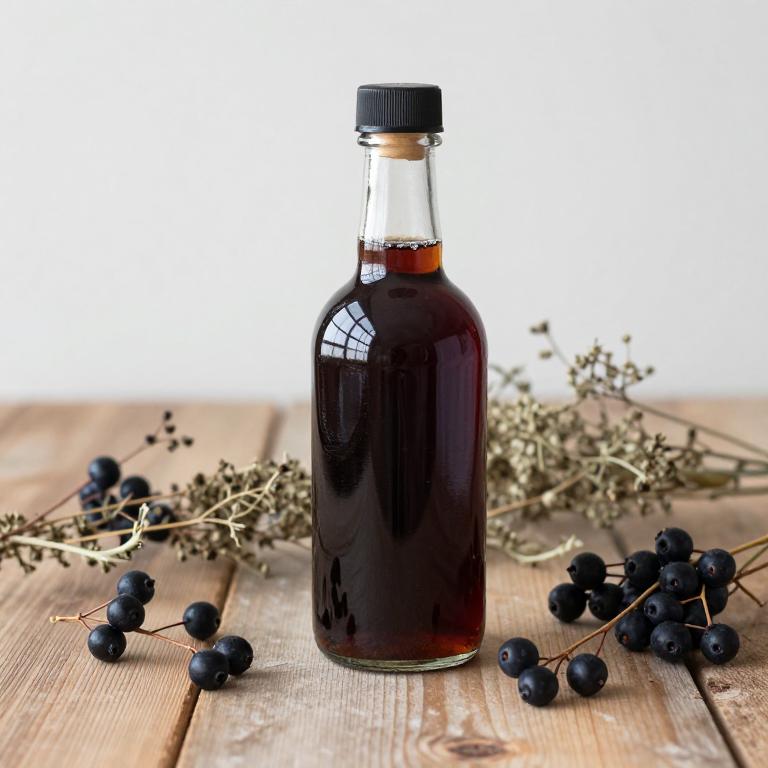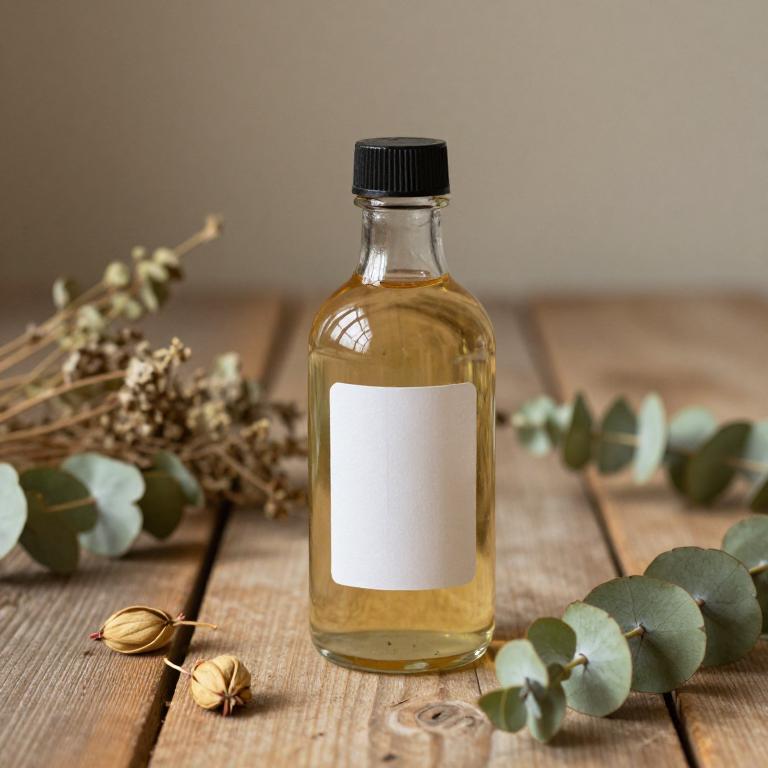10 Best Herbal Syrups For Laryngitis

Herbal syrups are commonly used to alleviate symptoms of laryngitis, which is an inflammation of the larynx often caused by viral infections or overuse of the voice.
These syrups typically contain natural ingredients such as licorice root, thyme, eucalyptus, and marshmallow root, which are known for their soothing and anti-inflammatory properties. They help to reduce throat irritation, ease coughing, and promote healing by moisturizing the mucous membranes in the throat. Many herbal syrups are considered safe for adults and children, though it is important to consult a healthcare provider before use, especially for those with allergies or taking other medications.
Overall, herbal syrups offer a natural and gentle alternative for managing laryngitis symptoms.
Table of Contents
- 1. Thyme (Thymus vulgaris)
- 2. Ginger (Zingiber officinale)
- 3. Licorice (Glycyrrhiza glabra)
- 4. Rosemary (Rosmarinus officinalis)
- 5. Fennel (Foeniculum vulgare)
- 6. Salvia (Salvia officinalis)
- 7. Black elderberry (Sambucus nigra)
- 8. Eucalyptus (Eucalyptus globulus)
- 9. Peppermint (Mentha piperita)
- 10. Stinging nettle (Urtica dioica)
1. Thyme (Thymus vulgaris)

Thymus vulgaris, commonly known as thyme, is often used in herbal syrups to alleviate symptoms of laryngitis due to its antimicrobial and anti-inflammatory properties.
These syrups are typically made by infusing thyme leaves in a base of honey or sugar, which enhances their soothing effects on the throat. The essential oils in thyme, particularly thymol, help to reduce throat irritation and combat respiratory infections. Many people find relief from coughing and hoarseness by using thyme-based syrups as a natural remedy.
However, it is important to consult with a healthcare provider before using herbal treatments, especially for children or individuals with allergies.
2. Ginger (Zingiber officinale)

Zingiber officinale, commonly known as ginger, has been traditionally used for its anti-inflammatory and soothing properties, making it a popular ingredient in herbal syrups for laryngitis.
These syrups often combine ginger with honey, lemon, and other natural ingredients to create a warm, comforting remedy that can help reduce throat irritation and ease coughing. The active compounds in ginger, such as gingerol and shogaol, are believed to help reduce inflammation and stimulate mucus production, which can alleviate symptoms of laryngitis. While herbal syrups are generally considered safe for most adults, it is advisable to consult a healthcare professional before use, especially for children or individuals with allergies or chronic health conditions.
Overall, ginger-based syrups offer a natural alternative for managing laryngitis, though they should complement, not replace, conventional medical treatments when necessary.
3. Licorice (Glycyrrhiza glabra)

Glycyrrhiza glabra, commonly known as licorice root, has been traditionally used in herbal medicine for its soothing properties, particularly for conditions like laryngitis.
Licorice root syrup is often prepared by extracting the root in water or alcohol, resulting in a viscous, sweet-tasting preparation that can be easily administered. The active compounds in licorice, such as glycyrrhizin and flavonoids, are believed to reduce inflammation and irritation in the throat, making it a popular remedy for sore throats and hoarseness. However, long-term use of licorice root syrup may lead to side effects such as hypertension due to its effect on the adrenal glands.
As a complementary therapy, licorice syrup is often used alongside other treatments for laryngitis under the guidance of a healthcare professional.
4. Rosemary (Rosmarinus officinalis)

Rosmarinus officinalis, commonly known as rosemary, is often used in herbal syrups to alleviate symptoms of laryngitis due to its anti-inflammatory and expectorant properties.
These syrups are traditionally prepared by infusing rosemary leaves in a base of honey or sugar, which helps preserve the plant's active compounds. The essential oils in rosemary, such as cineole and camphor, may help reduce throat irritation and ease coughing. While not a substitute for medical treatment, rosemary syrups can provide natural relief for mild laryngitis when used as part of a holistic care approach.
However, individuals with allergies to the plant or those taking certain medications should consult a healthcare provider before use.
5. Fennel (Foeniculum vulgare)

Foeniculum vulgare, commonly known as fennel, has been traditionally used in herbal medicine for its soothing properties, and fennel-based herbal syrups are often recommended for the treatment of laryngitis.
These syrups contain essential oils like anethol, which have anti-inflammatory and expectorant effects that help reduce throat irritation and ease coughing. The warm, licorice-like flavor of fennel syrup makes it palatable and easy to consume, especially for children and adults suffering from sore throats. Studies suggest that fennel may help alleviate symptoms by reducing swelling in the respiratory tract and promoting mucus clearance.
However, while generally considered safe, individuals with allergies to related plants should consult a healthcare provider before using fennel syrup.
6. Salvia (Salvia officinalis)

Salvia officinalis, commonly known as sage, has been traditionally used in herbal medicine for its soothing and anti-inflammatory properties.
Herbal syrups made from sage are often recommended for laryngitis due to their ability to reduce throat irritation and ease coughing. These syrups typically contain a combination of sage extract, honey, and other natural ingredients that work together to calm inflamed tissues in the throat. The antimicrobial and antiseptic qualities of sage may also help combat infections that contribute to laryngitis.
While generally safe when used as directed, it is advisable to consult a healthcare professional before using sage syrup, especially for children or individuals with known allergies.
7. Black elderberry (Sambucus nigra)

Sambucus nigra, commonly known as elderberry, is often used in herbal syrups to support the treatment of laryngitis due to its high antioxidant and anti-inflammatory properties.
These syrups are traditionally believed to help soothe throat irritation and reduce inflammation in the vocal cords, which can alleviate symptoms such as hoarseness and soreness. While some studies suggest that elderberry may enhance immune function, scientific evidence specifically linking it to the treatment of laryngitis is limited. It is typically recommended to use these syrups as a complementary therapy alongside conventional medical treatments for laryngitis.
As with any herbal remedy, it is important to consult with a healthcare provider before use, especially for individuals with allergies or chronic health conditions.
8. Eucalyptus (Eucalyptus globulus)

Eucalyptus globulus, commonly known as the Australian eucalyptus, is often used in herbal syrups to alleviate symptoms of laryngitis due to its anti-inflammatory and decongestant properties.
These syrups typically contain eucalyptus oil, which helps to reduce throat irritation and ease coughing by soothing the respiratory tract. The menthol-like compounds in eucalyptus globulus can provide a cooling effect, offering temporary relief from soreness and inflammation in the throat. While generally considered safe for adults, caution is advised for children and individuals with asthma or allergies, as eucalyptus oil may cause adverse reactions.
Herbal syrups containing eucalyptus globulus are often used as a complementary therapy alongside conventional treatments for mild to moderate laryngitis.
9. Peppermint (Mentha piperita)

Mentha piperita, commonly known as peppermint, is often used in herbal syrups to alleviate symptoms of laryngitis due to its soothing and anti-inflammatory properties.
These syrups help reduce throat irritation and ease coughing by providing a cooling effect on the mucous membranes. The essential oils in peppermint, such as menthol, can help loosen mucus and improve breathing, making it beneficial for those with persistent hoarseness or sore throat. Herbal syrups containing mentha piperita are typically prepared with honey or glycerin to enhance their effectiveness and palatability.
While they are generally safe for adults, they should be used with caution in children and individuals with certain medical conditions.
10. Stinging nettle (Urtica dioica)

Urtica dioica, commonly known as stinging nettle, has been traditionally used in herbal medicine for its anti-inflammatory and soothing properties.
Herbal syrups made from Urtica dioica are often recommended for alleviating symptoms of laryngitis, such as sore throat and hoarseness, due to their high content of minerals and antioxidants. These syrups work by reducing inflammation in the throat and supporting the body's natural healing processes. They are typically prepared by combining dried nettle leaves with honey or other natural sweeteners to create a palatable and effective remedy.
However, individuals with allergies to plants in the Urtica family should exercise caution and consult a healthcare professional before use.